8 mar 2018
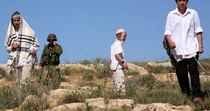
Israeli settlers at noontime Thursday stormed Palestinian lands in the northern Jordan Valley, east of Tubas province.
According to eye-witnesses, Israeli settlers riding horses were caught on Palestinian lands in Khilet Hamad and al-Hama in the northern Jordan Valley.
Palestinian farmers and shepherds raised fears of projected assaults by Israeli settlers on their livestock, agricultural kit, and property.
Israeli settlers have frequently assaulted Palestinian farmers and shepherds in the northern Jordan Valley, in an attempt to force them out of their land in favor of illegal settlement expansion.
According to eye-witnesses, Israeli settlers riding horses were caught on Palestinian lands in Khilet Hamad and al-Hama in the northern Jordan Valley.
Palestinian farmers and shepherds raised fears of projected assaults by Israeli settlers on their livestock, agricultural kit, and property.
Israeli settlers have frequently assaulted Palestinian farmers and shepherds in the northern Jordan Valley, in an attempt to force them out of their land in favor of illegal settlement expansion.
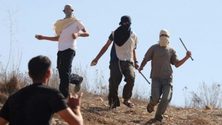
Israeli Jewish settlers attacked, on Thursday, Palestinian farmers as they were ploughing their land in the village of al-Sawiyeh, south of Nablus, according to a local official.
Ghassan Daghlas, who monitors settlement activities in northern West Bank district, said that settlers from the illegal settlement of Rahalim, built on al-Sawiyeh land, attacked the farmers and prevented them from ploughing their land.
The settlers also destroyed 40 fully grown olive trees owned by the Salman family, according to WAFA.
Meanwhile, said Daghlas, Israeli military authorities decided to seize land near Burin high school, south of Nablus, under the security pretext.
He said that the army had announced, two months ago, that it plans to seize land in Burin to build a fence that would separate the school and land in that area from the main Qalqilya-Nablus road and came back on Thursday to confirm with maps its decision to seize that land, warning that the fence may eventually cause residents to lose a lot more of their agricultural land, which is their only source of income.
Ghassan Daghlas, who monitors settlement activities in northern West Bank district, said that settlers from the illegal settlement of Rahalim, built on al-Sawiyeh land, attacked the farmers and prevented them from ploughing their land.
The settlers also destroyed 40 fully grown olive trees owned by the Salman family, according to WAFA.
Meanwhile, said Daghlas, Israeli military authorities decided to seize land near Burin high school, south of Nablus, under the security pretext.
He said that the army had announced, two months ago, that it plans to seize land in Burin to build a fence that would separate the school and land in that area from the main Qalqilya-Nablus road and came back on Thursday to confirm with maps its decision to seize that land, warning that the fence may eventually cause residents to lose a lot more of their agricultural land, which is their only source of income.
7 mar 2018
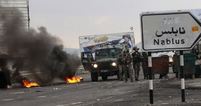
A Palestinian boy was shot and injured by the Israeli occupation forces on Wednesday in clashes rocking Nablus’s southern town of Burin, in the southern occupied West Bank.
Activist Ghassan Dughlas, who monitors settlement activity in the northern West Bank, said clashes flared up in Burin after Israeli settlers attacked a Palestinian shepherd in the eastern corners of the town.
17-year-old Mahmoud Umran was shot with live ammunition in his foot and was rushed to a hospital for urgent treatment.
Activist Ghassan Dughlas, who monitors settlement activity in the northern West Bank, said clashes flared up in Burin after Israeli settlers attacked a Palestinian shepherd in the eastern corners of the town.
17-year-old Mahmoud Umran was shot with live ammunition in his foot and was rushed to a hospital for urgent treatment.
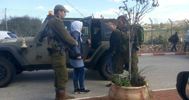
Israeli soldiers on Wednesday evening kidnapped a Palestinian girl after she was violently beaten by an Israeli settler in al-Khalil’s southern town of Yatta, in the southern occupied West Bank.
Coordinator for the Popular Anti-Settlement Committee, Rateb al-Jabour, said the Israeli occupation forces kidnapped 13-year-old Jamalat Abu Kbeita shortly after an Israeli settler assaulted her.
The girl was accused of attempting to carry out an anti-occupation stabbing attack.
Eye-witnesses refuted the Israeli allegations, saying the girl was on her father’s land when she was attacked.
The settler reportedly beat the girl moments after her father headed to the local authorities to file a complaint against Israeli settlers who misappropriated six dunums of his private land lot and grazed their livestock in his cultivated ranches.
Coordinator for the Popular Anti-Settlement Committee, Rateb al-Jabour, said the Israeli occupation forces kidnapped 13-year-old Jamalat Abu Kbeita shortly after an Israeli settler assaulted her.
The girl was accused of attempting to carry out an anti-occupation stabbing attack.
Eye-witnesses refuted the Israeli allegations, saying the girl was on her father’s land when she was attacked.
The settler reportedly beat the girl moments after her father headed to the local authorities to file a complaint against Israeli settlers who misappropriated six dunums of his private land lot and grazed their livestock in his cultivated ranches.
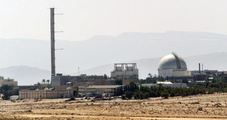
Policies and practices implemented by the Israeli occupation authorities, under the guise of security concerns, have resulted in the forcible transfer of Palestinians from their homes in al-Khalil city, reducing a once thriving area to a 'ghost town’, according to a press release by the United Nations Office for the Coordination of Humanitarian Affairs (OCHA).
Israel exercises direct control over 20% of al-Khalil city, known as H2, which is home to approximately 40,000 Palestinians and a few hundred Israeli settlers living in five settlement compounds, noted the release.
OCHA maintained that the living conditions of those Palestinians who remain in the closed and restricted areas have been gradually undermined, including with regard to basic services and sources of livelihood.
It said the isolation of the settlement area and its surroundings from the rest of the city has severely disrupted the family and social life of the Palestinians living there and undermined their dignity and psycho-social well-being.
“Attacks and intimidation by Israeli settlers have been key components of the coercive environment exerted on Palestinians living in the vicinity of the settlement area,” the press release read.
As the occupying power, Israel must protect Palestinian civilians in al-Khalil city, ensure that their humanitarian needs are met, and that they are able to exercise their human rights, including their right to freedom of movement and to be free from discrimination, the release further stressed.
Israel exercises direct control over 20% of al-Khalil city, known as H2, which is home to approximately 40,000 Palestinians and a few hundred Israeli settlers living in five settlement compounds, noted the release.
OCHA maintained that the living conditions of those Palestinians who remain in the closed and restricted areas have been gradually undermined, including with regard to basic services and sources of livelihood.
It said the isolation of the settlement area and its surroundings from the rest of the city has severely disrupted the family and social life of the Palestinians living there and undermined their dignity and psycho-social well-being.
“Attacks and intimidation by Israeli settlers have been key components of the coercive environment exerted on Palestinians living in the vicinity of the settlement area,” the press release read.
As the occupying power, Israel must protect Palestinian civilians in al-Khalil city, ensure that their humanitarian needs are met, and that they are able to exercise their human rights, including their right to freedom of movement and to be free from discrimination, the release further stressed.

Dozens of Israeli settlers stormed on Wednesday morning Jerusalem’s al-Aqsa Mosque—the third holiest site in Islam—via the Maghareba Gate and took fury-rousing snapshots.
A horde of 44 Israeli settlers, escorted by policemen, broke into al-Aqsa Mosque as part of the morning break-in shift and carried out a round of sacrilegious tours. Dozens more are expected to show up at the site in the next few hours.
Israeli police troops have been stationed at the site since the early morning to protect the settlers.
The settlers took selfies as soon as they caught sight of the Dome of the Rock, stirring the anger of the Muslim worshipers who were praying at the site.
Extremist Israelis were also spotted as performing sacrilegious rituals near al-Rahma Gate.
At the same time, the peaceful Muslim worshipers have been subjected to tough crackdowns and restrictions by the Israeli police near the main entrances to the site.
Several worshipers have been searched and dozens more have had their IDs seized while attempting to enter al-Aqsa to perform their daily prayers.
A horde of 44 Israeli settlers, escorted by policemen, broke into al-Aqsa Mosque as part of the morning break-in shift and carried out a round of sacrilegious tours. Dozens more are expected to show up at the site in the next few hours.
Israeli police troops have been stationed at the site since the early morning to protect the settlers.
The settlers took selfies as soon as they caught sight of the Dome of the Rock, stirring the anger of the Muslim worshipers who were praying at the site.
Extremist Israelis were also spotted as performing sacrilegious rituals near al-Rahma Gate.
At the same time, the peaceful Muslim worshipers have been subjected to tough crackdowns and restrictions by the Israeli police near the main entrances to the site.
Several worshipers have been searched and dozens more have had their IDs seized while attempting to enter al-Aqsa to perform their daily prayers.
6 mar 2018
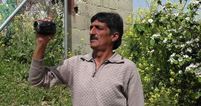
An extremist Jewish settler on Tuesday attempted to ram his car into a Palestinian human rights activist Emad Abu Shamsiya.
Abu Shamsiya said that while he was returning home in Tal al-Rumaidah neighborhood, a fanatic settler, called Ofer, tried to hit him by his car before he hardly managed to escape.
He pointed out that it was not the first time in which he was subjected to such an attack in the area by Israeli settlers. “I immediately filed a complaint to the Israeli occupation police against settler Ofer as I was able to recognize his face”, Abu Shamsiya said.
Abu Shamsiya said that while he was returning home in Tal al-Rumaidah neighborhood, a fanatic settler, called Ofer, tried to hit him by his car before he hardly managed to escape.
He pointed out that it was not the first time in which he was subjected to such an attack in the area by Israeli settlers. “I immediately filed a complaint to the Israeli occupation police against settler Ofer as I was able to recognize his face”, Abu Shamsiya said.
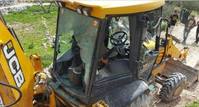
Dozens of Israeli armed settlers attacked on Tuesday morning Einabus town, south of the northern West Bank province of Nablus.
Head of the village council Taleb Hamed told PIC reporter that nearly 30 heavily armed settlers stormed the northern part of the town and brutally attacked a bulldozer driver while working in an agricultural land.
The settlers opened fire at local residents when they tried to prevent the attack, he added.
In the absence of any protection from the Israeli army or the PA, Palestinian villages are routinely subjected to similar attacks. Video
Head of the village council Taleb Hamed told PIC reporter that nearly 30 heavily armed settlers stormed the northern part of the town and brutally attacked a bulldozer driver while working in an agricultural land.
The settlers opened fire at local residents when they tried to prevent the attack, he added.
In the absence of any protection from the Israeli army or the PA, Palestinian villages are routinely subjected to similar attacks. Video
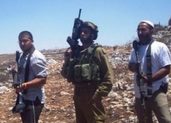
Several Israeli colonizers, living in the Mitzpe Yair illegal outpost in Hebron, in the southern part of the West Bank, attacked three Palestinian children while heading back home, Monday, while another colonizer tried to ram a child with his car.
Rateb Jabour, the coordinator of the Popular and National Committees in southern Hebron, said the colonizers attacked three children from Abu Qbeita family, while crossing a military roadblock, heading back home.
He added that another colonizer tried to ram a child, identified as Jihan Ibrahim Abu Qbeita, 11, in the same area, but she managed to avoid his car.
Jabour also stated that Abu Qbeita family must cross the military roadblock everyday whenever they leave their home or return to it, and that international peace activists constantly accompany them to ensure their safety, as they are subject to frequent attacks.
In related news, Israeli soldiers installed two iron gates at the Kharsa village junction, south of Doura town, southwest of Hebron.
The junction leads to Kharsa and several Palestinian communities, south of Doura.
Rateb Jabour, the coordinator of the Popular and National Committees in southern Hebron, said the colonizers attacked three children from Abu Qbeita family, while crossing a military roadblock, heading back home.
He added that another colonizer tried to ram a child, identified as Jihan Ibrahim Abu Qbeita, 11, in the same area, but she managed to avoid his car.
Jabour also stated that Abu Qbeita family must cross the military roadblock everyday whenever they leave their home or return to it, and that international peace activists constantly accompany them to ensure their safety, as they are subject to frequent attacks.
In related news, Israeli soldiers installed two iron gates at the Kharsa village junction, south of Doura town, southwest of Hebron.
The junction leads to Kharsa and several Palestinian communities, south of Doura.
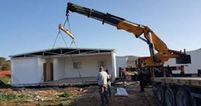
Dozens of Jewish settlers on Monday placed mobile homes on Mount Juwaihan to the northeast of al-Khalil city as a prelude to establishing a new outpost in the area.
According to local sources, the settlers transported the prefabricated homes to the area under military protection and placed them on land belonging to Palestinian citizens from the family of Aida.
The seized land is located close to the junction of Beit Einun, which is considered a major artery for the town of Sa’ir, Ash-Shuyukh.
According to local sources, the settlers transported the prefabricated homes to the area under military protection and placed them on land belonging to Palestinian citizens from the family of Aida.
The seized land is located close to the junction of Beit Einun, which is considered a major artery for the town of Sa’ir, Ash-Shuyukh.
5 mar 2018
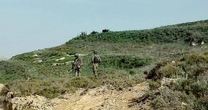
A group of Israeli settlers stormed on Monday a Palestinian-owned agricultural land east of al-Khalil, to the south of West Bank.
Local sources told Quds Press that the settlers were escorted by large numbers of Israeli Occupation Forces (IOF) and a military bulldozer into the Palestinian lands.
Bulldozing operations were carried out in the area during the raid, the sources added.
Meanwhile, local farmers gathered in the area in an attempt to expel the settlers from their lands.
Israeli settlers are used to break into the area as a prelude to take control over it in profit of settlement expansion.
Local sources told Quds Press that the settlers were escorted by large numbers of Israeli Occupation Forces (IOF) and a military bulldozer into the Palestinian lands.
Bulldozing operations were carried out in the area during the raid, the sources added.
Meanwhile, local farmers gathered in the area in an attempt to expel the settlers from their lands.
Israeli settlers are used to break into the area as a prelude to take control over it in profit of settlement expansion.
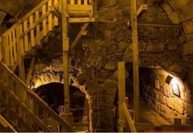
The ongoing Israeli excavations under Palestinian homes in Wadi Hilweh Neighborhood, in Silwan town south of the Al-Aqsa Mosque in occupied Jerusalem, have led to further structural damage to several homes.
The Wadi Hilweh Information Center in Silwan (Silwanic) said the excavations are causing serious damage to the homes, especially to their foundations.
It added that the Palestinians protested the digging, but were assaulted by Israeli colonizers, before soldiers threatened to abduct and impose fines on them.
Many Palestinian homes have sustained serious structural damage during the ongoing excavations, as Israel is digging to create a network of tunnels leading to the Al-Aqsa Mosque, and al-Buraq area. Video
The Wadi Hilweh Information Center in Silwan (Silwanic) said the excavations are causing serious damage to the homes, especially to their foundations.
It added that the Palestinians protested the digging, but were assaulted by Israeli colonizers, before soldiers threatened to abduct and impose fines on them.
Many Palestinian homes have sustained serious structural damage during the ongoing excavations, as Israel is digging to create a network of tunnels leading to the Al-Aqsa Mosque, and al-Buraq area. Video
4 mar 2018
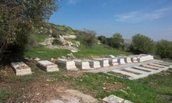
Approximately 40 percent of Israeli settlers’ graves in the occupied West Bank were built on privately-owned Palestinian land, an Israeli survey published on Sunday .
A survey published by Haaretz revealed, according to Al Ray, that more than 600 graves, on 10 settlements, were built on privately owned Palestinian lands in West Bank that Israeli occupation authorities expropriated.
According to a study by the left-wing Kerem Navot, the grave of Rabbi Raziel Shivah, who was shot dead in early January, near Nablus, was built on disputed land near the settlement outpost of Havat Gilad.
According to the study, there are more than 33 Israeli cemeteries in Israeli settlements , some of them are small while others are main cemeteries.
The study pointed out that about 1,400 settlers were buried in these cemeteries, most of them on Palestinian lands. Two main cemeteries were built in Hebron and Kafer Etzion, on Palestinian lands that were bought by Israelis in 1948.
The graves, built on private Palestinian lands near the settlements of Beit El, Ofra, Psagot, Ma’aleh Mishmash, Alon Moreh and Kiryat Arba, where the grave of Baruch Goldstein is located.
According to the study, some of these graves were built on land confiscated under security pretexts, and some of them sit hundreds of meters away from the homes of settlers within those settlements, so as not to be removed or to be handed over to the Palestinian owners.
The Israeli Civil Administration refused to explain if it had given permits to build these graves on private Palestinian land.
A survey published by Haaretz revealed, according to Al Ray, that more than 600 graves, on 10 settlements, were built on privately owned Palestinian lands in West Bank that Israeli occupation authorities expropriated.
According to a study by the left-wing Kerem Navot, the grave of Rabbi Raziel Shivah, who was shot dead in early January, near Nablus, was built on disputed land near the settlement outpost of Havat Gilad.
According to the study, there are more than 33 Israeli cemeteries in Israeli settlements , some of them are small while others are main cemeteries.
The study pointed out that about 1,400 settlers were buried in these cemeteries, most of them on Palestinian lands. Two main cemeteries were built in Hebron and Kafer Etzion, on Palestinian lands that were bought by Israelis in 1948.
The graves, built on private Palestinian lands near the settlements of Beit El, Ofra, Psagot, Ma’aleh Mishmash, Alon Moreh and Kiryat Arba, where the grave of Baruch Goldstein is located.
According to the study, some of these graves were built on land confiscated under security pretexts, and some of them sit hundreds of meters away from the homes of settlers within those settlements, so as not to be removed or to be handed over to the Palestinian owners.
The Israeli Civil Administration refused to explain if it had given permits to build these graves on private Palestinian land.
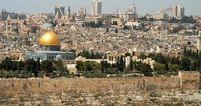
Elad settler group has revealed that it is preparing for the implementation of 11 new settlement projects approved in 2017 and 2018.
Elad said in a statement that some of these projects do not require the approval of the Israeli government or the Jerusalem municipality, but the settler group still enjoys the support of both parties.
In response to an objection filed by the Israeli National Fund against a permit given by the Jerusalem municipality to Elad to establish a 784-meter zip-line in the city, the municipality affirmed that the approval was legal.
This project is part of a series of settlement projects adopted by Elad in the Old City of Jerusalem, including the establishment of a restaurant and a cable car, under the pretext of promoting foreign and domestic tourism.
Palestinian lawyer Ehab Abu Ghoush said that the new projects target large areas of Palestinian land in East Jerusalem which was occupied in 1967; therefore, any Israeli settlement activity in these areas is illegal and violates international law.
Abu Ghoush affirmed that the disagreement between the Israeli National Fund and Elad group is fake and it is only an attempt to legalize the confiscation of occupied Palestinian lands.
Elad said in a statement that some of these projects do not require the approval of the Israeli government or the Jerusalem municipality, but the settler group still enjoys the support of both parties.
In response to an objection filed by the Israeli National Fund against a permit given by the Jerusalem municipality to Elad to establish a 784-meter zip-line in the city, the municipality affirmed that the approval was legal.
This project is part of a series of settlement projects adopted by Elad in the Old City of Jerusalem, including the establishment of a restaurant and a cable car, under the pretext of promoting foreign and domestic tourism.
Palestinian lawyer Ehab Abu Ghoush said that the new projects target large areas of Palestinian land in East Jerusalem which was occupied in 1967; therefore, any Israeli settlement activity in these areas is illegal and violates international law.
Abu Ghoush affirmed that the disagreement between the Israeli National Fund and Elad group is fake and it is only an attempt to legalize the confiscation of occupied Palestinian lands.
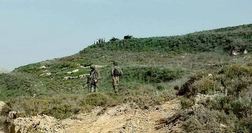
Israeli settlers on Sunday evening attacked Palestinian farmers in Asira al-Qibliyeh town, south of Nablus province.
A PIC news correspondent said Israelis residing in Yitzhar illegal settlement, built on Palestinian lands in the area, violently assaulted a group of Palestinian farmers and locals as they were carrying out works to establish an agricultural road leading to Palestinian lands in the area.
Settler attacks across the northern West Bank province of Nablus have been on the rise. Settler violations include arson attacks, property theft, land confiscation, heavy beating, and racist spray-painting.
A PIC news correspondent said Israelis residing in Yitzhar illegal settlement, built on Palestinian lands in the area, violently assaulted a group of Palestinian farmers and locals as they were carrying out works to establish an agricultural road leading to Palestinian lands in the area.
Settler attacks across the northern West Bank province of Nablus have been on the rise. Settler violations include arson attacks, property theft, land confiscation, heavy beating, and racist spray-painting.

Hordes of Israeli settlers stormed al-Aqsa Mosque's courtyards on Sunday under heavy police protection.
The PIC reporter said that 46 settlers broke into the Mosque via al-Maghareba Gate in consecutive groups with strict security measures imposed at al-Aqsa gates.
He pointed out that the former head of the Shin Bet Ami Ayalon led 32 Jewish students into the site and delivered presentations on the history of the alleged "Temple Mount".
Settlers' incursions into al-Aqsa Mosque are carried out on a daily basis, except for Fridays and Saturdays, though al-Maghareba Gate whose keys were seized by Israel in 1967.
The PIC reporter said that 46 settlers broke into the Mosque via al-Maghareba Gate in consecutive groups with strict security measures imposed at al-Aqsa gates.
He pointed out that the former head of the Shin Bet Ami Ayalon led 32 Jewish students into the site and delivered presentations on the history of the alleged "Temple Mount".
Settlers' incursions into al-Aqsa Mosque are carried out on a daily basis, except for Fridays and Saturdays, though al-Maghareba Gate whose keys were seized by Israel in 1967.
3 mar 2018

Israel’s judiciary system reportedly did not, and still does not, act in isolation from Israeli political considerations in many stations related to Palestinian lives and the ongoing conflict on the ground, between settlers, the government of Israel and Palestinian citizens.
The judicial system usually intervenes under the direction of the political and security levels to legitimize, here and elsewhere, the confiscation of Palestinian land and its transfer for settlement purposes. Within this context, there is an attempt to politicize the Israeli judiciary to work smoothly, to settle and legitimize more settlement outposts set up by the Israeli government, in the West Bank.
In an interview with Israel’s Ch. 7, Justice Minister Ayelet Shaked revealed Israeli efforts, in the field of law and order, to settle and legitimize settlement outposts in the West Bank.
The Committee for the Appointment of Judges in Israel, headed by Shaked, has now approved the appointment of Bahia Zandberg as a judge In the Central Court of Jerusalem, after serving as chairwoman of the Committee on the Bleaching of Settlements, and who is a close ally of Shaked (Jewish Home Party). Zandberg led two legal campaigns supporting the settlers, which were contrary to the instructions of the Ministry of Justice and the legal adviser to the government, and their positions, and was then appointed to the Public Prosecutor’s Office. Through his appointment, Shaked seeks to consolidate the settlement policy and prevent the evacuation of settlement outposts in the occupied West Bank, including those that are built on private Palestinian land, and not only the so-called “state lands.”
With the transfer of powers to the central court, Zandberg will have the greatest influence on decisions about settlements and outposts, which would increase settlement construction even if the government or the political echelon opposed it. The appointment of Alex Shtain and Ofer Grosskov as judges in the Supreme Court was seen as a victory for Shaked, who supported a number of nominations in various courts. Shaked appointed Esther Hayout as the head of the Supreme Court, under whom judges would not object to the appointment of the judge in the Jerusalem District Court, Yigal Marzel, as head of the court. In her comments on the appointments, Shaked said, “This is the one of the happiest days in the Israeli judiciary.”
PNN further reports that the Israeli government has begun the building of units in the new settlement of Amihai, located near the settlement of Shilo, between Nablus and Ramallah cities. Ameihai settlement is supposed to house 40 families evacuated by Israeli authorities in February of 2017, from the “Amona” settlement near the Ramallah governorate, which was built on private Palestinian land.
The Israeli “Kelvin” company, for excavation works, has put up mobile homes in the new “Amihai” settlement, on the lands of Jaloud village, in Nablus, in basin 16 (also known as Jabal Abu Rokhm), where extremist settlers asked the government to recognize the settlement, following Israeli occupation forces’ evacuation of the Amona outpost.
The new settlement seized agricultural land comprising more than 205 dunams on September 11th, under the pretext of appropriating “State land”. Israeli Interior Minister Aryeh Deri said, earlier, that all obstacles of construction in settlements have been removed, as a budget of more than NIS 40,000,000 was allocated for that. Reports said the Israeli Ministry of Finance would transfer NIS 55,000,000 to the Interior Ministry, to be transferred to the Regional council in the occupied West Bank.
Moreover, Deri gave the green light to Israeli Planning and Construction institutions for the construction of a new settlement near the Qalqilia city, to accommodate more than 20,000 settlers through the four merging settlements of Sh’ari Tekva, Itis Efrim and Elkana within one regional settlement council. “Oranit” will be added, in 2023, to be the large city for settlers.
On the other hand, PM Netanyahu has allocated NIS 60,000,000 to build homes for settlers, who will be evacuated from the “Netiv Haqvot” outpost, to the south of Bethlehem. The Israeli government will evacuate settlers from 15 buildings, from the outposts. Education Minister Naftali Bennett and Justice Minister Shaked visited the outpost and met with the settlers, assuring them that they will work with the government to postpone the evacuation process. In Jerusalem, the Jerusalem Municipality approved a plan to build 3,000 settlement units outside the Green Line, in occupied Jerusalem, on 280 dunams, naming it the “Olive Grove” neighborhood.
In serious statements during a closed-door meeting with the heads of Jewish organizations in North Africa, the US Ambassador to Tel Aviv, David Friedman, explained that the issue of evacuating settlers worries the Israeli government, adding that the military’s leadership is more oriented towards religious Zionism, and that its officers are committed to this land as the land given to them by the God, believing that the eviction could lead to civil war.
The judicial system usually intervenes under the direction of the political and security levels to legitimize, here and elsewhere, the confiscation of Palestinian land and its transfer for settlement purposes. Within this context, there is an attempt to politicize the Israeli judiciary to work smoothly, to settle and legitimize more settlement outposts set up by the Israeli government, in the West Bank.
In an interview with Israel’s Ch. 7, Justice Minister Ayelet Shaked revealed Israeli efforts, in the field of law and order, to settle and legitimize settlement outposts in the West Bank.
The Committee for the Appointment of Judges in Israel, headed by Shaked, has now approved the appointment of Bahia Zandberg as a judge In the Central Court of Jerusalem, after serving as chairwoman of the Committee on the Bleaching of Settlements, and who is a close ally of Shaked (Jewish Home Party). Zandberg led two legal campaigns supporting the settlers, which were contrary to the instructions of the Ministry of Justice and the legal adviser to the government, and their positions, and was then appointed to the Public Prosecutor’s Office. Through his appointment, Shaked seeks to consolidate the settlement policy and prevent the evacuation of settlement outposts in the occupied West Bank, including those that are built on private Palestinian land, and not only the so-called “state lands.”
With the transfer of powers to the central court, Zandberg will have the greatest influence on decisions about settlements and outposts, which would increase settlement construction even if the government or the political echelon opposed it. The appointment of Alex Shtain and Ofer Grosskov as judges in the Supreme Court was seen as a victory for Shaked, who supported a number of nominations in various courts. Shaked appointed Esther Hayout as the head of the Supreme Court, under whom judges would not object to the appointment of the judge in the Jerusalem District Court, Yigal Marzel, as head of the court. In her comments on the appointments, Shaked said, “This is the one of the happiest days in the Israeli judiciary.”
PNN further reports that the Israeli government has begun the building of units in the new settlement of Amihai, located near the settlement of Shilo, between Nablus and Ramallah cities. Ameihai settlement is supposed to house 40 families evacuated by Israeli authorities in February of 2017, from the “Amona” settlement near the Ramallah governorate, which was built on private Palestinian land.
The Israeli “Kelvin” company, for excavation works, has put up mobile homes in the new “Amihai” settlement, on the lands of Jaloud village, in Nablus, in basin 16 (also known as Jabal Abu Rokhm), where extremist settlers asked the government to recognize the settlement, following Israeli occupation forces’ evacuation of the Amona outpost.
The new settlement seized agricultural land comprising more than 205 dunams on September 11th, under the pretext of appropriating “State land”. Israeli Interior Minister Aryeh Deri said, earlier, that all obstacles of construction in settlements have been removed, as a budget of more than NIS 40,000,000 was allocated for that. Reports said the Israeli Ministry of Finance would transfer NIS 55,000,000 to the Interior Ministry, to be transferred to the Regional council in the occupied West Bank.
Moreover, Deri gave the green light to Israeli Planning and Construction institutions for the construction of a new settlement near the Qalqilia city, to accommodate more than 20,000 settlers through the four merging settlements of Sh’ari Tekva, Itis Efrim and Elkana within one regional settlement council. “Oranit” will be added, in 2023, to be the large city for settlers.
On the other hand, PM Netanyahu has allocated NIS 60,000,000 to build homes for settlers, who will be evacuated from the “Netiv Haqvot” outpost, to the south of Bethlehem. The Israeli government will evacuate settlers from 15 buildings, from the outposts. Education Minister Naftali Bennett and Justice Minister Shaked visited the outpost and met with the settlers, assuring them that they will work with the government to postpone the evacuation process. In Jerusalem, the Jerusalem Municipality approved a plan to build 3,000 settlement units outside the Green Line, in occupied Jerusalem, on 280 dunams, naming it the “Olive Grove” neighborhood.
In serious statements during a closed-door meeting with the heads of Jewish organizations in North Africa, the US Ambassador to Tel Aviv, David Friedman, explained that the issue of evacuating settlers worries the Israeli government, adding that the military’s leadership is more oriented towards religious Zionism, and that its officers are committed to this land as the land given to them by the God, believing that the eviction could lead to civil war.
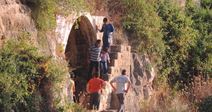
Eyewitnesses said on Saturday that Israeli settlers have escalated their break-ins into Palestinian archaeological sites in Nablus especially Deir Sam'an and Qarqash villages.
They told the PIC reporter that the settlers have stormed these areas, which date back to the Roman era, multiple times in recent days.
For his part, anti-settlement researcher Khalid Ma'ali said that settlers' raids and trips to such areas are aimed at Judaizing them and altering their history.
Ma'ali affirmed that Israel has repeatedly falsified the history of Palestinian sites in the West Bank and claimed that they belong to the Jews, expressing concern over the ongoing settlement expansion on Salfit lands, including its ancient sites.
He called on the concerned authorities to regularly clean and restore the Palestinian archaeological sites and raise awareness about their historical value.
They told the PIC reporter that the settlers have stormed these areas, which date back to the Roman era, multiple times in recent days.
For his part, anti-settlement researcher Khalid Ma'ali said that settlers' raids and trips to such areas are aimed at Judaizing them and altering their history.
Ma'ali affirmed that Israel has repeatedly falsified the history of Palestinian sites in the West Bank and claimed that they belong to the Jews, expressing concern over the ongoing settlement expansion on Salfit lands, including its ancient sites.
He called on the concerned authorities to regularly clean and restore the Palestinian archaeological sites and raise awareness about their historical value.

The United Nations Office for the Coordination of Humanitarian Affairs (OCHA) on Friday warned of the serious repercussions of the power crisis in the besieged Gaza Strip which mainly affects the health and education sectors.
OCHA said in a report that power supplies are critical to the provision of basic services related to health, water, sanitation and education in the Gaza Strip where two million Palestinians live.
The UN organization added that humanitarian agencies, to maintain the provision of basic services, try to provide emergency fuel funded by donors to keep vital, life-saving facilities operating. However, OCHA asserted, the available funds cover less than 40% of the minimal basic needs during 2018.
The report documented the demolition of 20 Palestinian structures in the West Bank which led to the displacement of 18 Palestinians, 10 of whom are children, and the destruction of the sources of income for 70 others. Five of the demolished buildings are located in Area C while 15 are located in Jerusalem.
OCHA also documented attacks by Israeli settlers in which 16 Palestinians were injured and Palestinian property lost or damaged in the West Bank. Four of the incidents occurred in Einabus and Asira al-Qibliya villages in Nablus reportedly by settlers from Yitzhar, Bracha and their surrounding outposts
OCHA's report noted that settler violence has been on the rise since the beginning of 2018, with a weekly average of six attacks, compared to an average of three in 2017 and two in 2016.
OCHA said in a report that power supplies are critical to the provision of basic services related to health, water, sanitation and education in the Gaza Strip where two million Palestinians live.
The UN organization added that humanitarian agencies, to maintain the provision of basic services, try to provide emergency fuel funded by donors to keep vital, life-saving facilities operating. However, OCHA asserted, the available funds cover less than 40% of the minimal basic needs during 2018.
The report documented the demolition of 20 Palestinian structures in the West Bank which led to the displacement of 18 Palestinians, 10 of whom are children, and the destruction of the sources of income for 70 others. Five of the demolished buildings are located in Area C while 15 are located in Jerusalem.
OCHA also documented attacks by Israeli settlers in which 16 Palestinians were injured and Palestinian property lost or damaged in the West Bank. Four of the incidents occurred in Einabus and Asira al-Qibliya villages in Nablus reportedly by settlers from Yitzhar, Bracha and their surrounding outposts
OCHA's report noted that settler violence has been on the rise since the beginning of 2018, with a weekly average of six attacks, compared to an average of three in 2017 and two in 2016.
